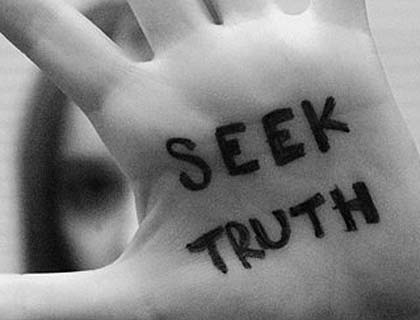French critic, essayist and novelist, Andre Gide, had once said, “Believe those who are seeking the truth. Doubt those who find it”. This saying seems a bit controversial but reading between the lines would depict that it has a lot of wisdom in it. Those who seek truth and keep on doing so come across various truths in life and would never stick to one of them. As, the universe is changing with every passing moment, there is a very small margin for truths to persist for ever; therefore, they change and it is necessary that in order to understand them, there should be continuous efforts by the human beings to seek them.
On the other hand those, who claim to have found the truth, have the tendency to stick to it and keep on insisting upon it. They, thus, give up seeking for it and fall into the imagination that the ultimate reality has been discovered and there is no need of further exploration.
The matter of fact is that the human beings understand the world through their knowledge and human knowledge is not perfect and complete enough to understand the entire universe and different phenomena in it. Thus what they understand at a particular time may be true as per their knowledge at that time but as they further advance in their knowledge and understanding of the universe the situation may change. Their previous truth may seem insufficient and may require further elaboration or the facts may point towards a truth that is totally against the accepted truth and may, thus, reject it completely.
Heraclitus of Ephesus, observing the changing nature of the world around, had said, “You cannot step twice in the same water.” What he meant to say is that by the time you step for the second time in the water, the water under your foot already changes because it flows. Considering such frequent changes in nature, it is difficult to find permanent truths very often.
History would also prove the fact that the truths keep on changing. For example, it was believed as a fact during the Dark Era in Europe and even supported by Christianity that Earth is the center of the universe and sun moves around it; however, it was only later discovered through development in scientific thinking and scientific technology that actually sun is the center of the solar system and the earth revolves around the sun.
There are myriads of other examples in history that prove that with the evolution in human knowledge there were changes in the understanding of phenomena that human beings considered as universal truths. For example, once it was considered a widely accepted truth that earth was flat; however, the later developments proved that it was round.
Knowing the universe as a changing reality is really very important. Those who have this outlook get nearer to the truth, while those who consider the universe as a static phenomenon are at a great loss. The biggest disadvantage for them is that they distant themselves from knowing the truth.
Those who believe that they know the ultimate truth are dangerous as well. They are dangerous in a sense that they consider others as not knowing the actual truths. Then, they become even more dangerous when they want to spread their perceived truths to others and even coerce them. They, sometimes, become violent and cannot tolerate that others should have opinion other than what they know; all because they know the ultimate truth.
People who have the misunderstanding that they know the truth, halt searching for more. They, as a matter of fact, reach to an intellectual death. Their understanding becomes full and there is no space for knowing more. The thirst for knowledge is quenched in them. Though they wear the crown of a king over their heads but in reality they are destitute.
Different extremist movements in the world, which have even killed thousands of people without any crime, have basically originated from the thinking that they are right and true, while the rest are wrong and must be amended. Taliban, for instance, consider their way of thinking and their beliefs as true and believe that all others are infidel. Thus it is their moral and the most sacred duty to make others follow the truth as well.
Resultantly, as Andre Gide has said we have to doubt those who find truth. We don’t have to believe them but challenge them. Reconsider their conclusions and must strive to keep on searching for truer.
A scientific way of thinking is never to consider something as a complete truth or complete false; rather it suggests, as Henry Augustus Rowland had said, “There is no such thing as absolute truth and absolute falsehood. The scientific mind should never recognize the perfect truth or the perfect falsehood of any supposed theory or observation. It should carefully weigh the chances of truth and error and grade each in its proper position along the line joining absolute truth and absolute error.”

